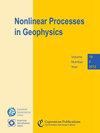参数卡尔曼滤波同化的多元公式:在简化化学迁移模型中的应用
IF 2.4
4区 地球科学
Q3 GEOSCIENCES, MULTIDISCIPLINARY
引用次数: 1
摘要
摘要这一贡献探索了一种通过使用参数卡尔曼滤波器(PKF)预测大气化学多元协变的新方法。在PKF形式中,误差协方差矩阵通过依赖于参数的协方差模型进行建模,然后计算其动力学。PKF先前已在单变量情况下进行了公式化,并在此探索了化学迁移模型的多变量扩展。这篇文章的重点是不确定性是由化学因素引起的,而不是由天气的不确定性引起的。为此,基于非线性Lotka–Volterra方程,引入了一维域上的简化两物种化学迁移模型,使我们能够提出一个多元伪协方差模型。然后,建立了多元PKF动力学方程,并将其结果与几个数值实验中的大集合卡尔曼滤波器(EnKF)进行了比较。在这些实验中,PKF准确地再现了EnKF。最终,PKF被公式化为一个由六种化学物质组成的更复杂的化学模型(通用反应集)。同样,PKF成功地再现了在大集合上诊断的多变量协变量。本文章由计算机程序翻译,如有差异,请以英文原文为准。
Toward a multivariate formulation of the parametric Kalman filter assimilation: application to a simplified chemical transport model
Abstract. This contribution explores a new approach to forecasting multivariate covariances for atmospheric chemistry through the use of the parametric Kalman filter (PKF). In the PKF formalism, the error covariance matrix is modellized by a covariance model relying on parameters, for which the dynamics are then computed. The PKF has been previously formulated in univariate cases, and a multivariate extension for chemical transport models is explored here. This contribution focuses on the situation where the uncertainty is due to the chemistry but not due to the uncertainty of the weather. To do so, a simplified two-species chemical transport model over a 1D domain is introduced, based on the non-linear Lotka–Volterra equations, which allows us to propose a multivariate pseudo covariance model. Then, the multivariate PKF dynamics are formulated and their results are compared with a large ensemble Kalman filter (EnKF) in several numerical experiments. In these experiments, the PKF accurately reproduces the EnKF. Eventually, the PKF is formulated for a more complex chemical model composed of six chemical species (generic reaction set). Again, the PKF succeeds at reproducing the multivariate covariances diagnosed on the large ensemble.
求助全文
通过发布文献求助,成功后即可免费获取论文全文。
去求助
来源期刊

Nonlinear Processes in Geophysics
地学-地球化学与地球物理
CiteScore
4.00
自引率
0.00%
发文量
21
审稿时长
6-12 weeks
期刊介绍:
Nonlinear Processes in Geophysics (NPG) is an international, inter-/trans-disciplinary, non-profit journal devoted to breaking the deadlocks often faced by standard approaches in Earth and space sciences. It therefore solicits disruptive and innovative concepts and methodologies, as well as original applications of these to address the ubiquitous complexity in geoscience systems, and in interacting social and biological systems. Such systems are nonlinear, with responses strongly non-proportional to perturbations, and show an associated extreme variability across scales.
 求助内容:
求助内容: 应助结果提醒方式:
应助结果提醒方式:


